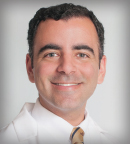Formal discussant of KEYNOTE-671, Mark Awad, MD, PhD, of the Dana-Farber Cancer Institute, Boston, was optimistic about these data. “A hazard ratio of 0.58 for event-free survival and signals favoring overall survival in stage II to III non–small cell lung cancer [NSCLC] are truly impressive. KEYNOTE-671 and other perioperative immunotherapy trials represent a major advance,” he said.

Mark Awad, MD, PhD
“In general, data support the neoadjuvant approach [in locally advanced NSCLC]. However, some questions remain,” Dr. Awad noted:
- Is neoadjuvant plus or minus adjuvant immunotherapy better than adjuvant immunotherapy? New biomarkers are needed to select patients for early-stage neoadjuvant therapy.
- Upon further follow-up, will there be a benefit in terms of overall survival with the perioperative approach?
- Why do some patients never make it to surgery? Perhaps some patients should go straight to surgery, but we don’t know which patients they are.
- What is the added contribution of continuing adjuvant immunotherapy in patients with a pathologic complete response? If they are in response, maybe they have had enough immunotherapy. If they had a poor pathologic response, why continue therapy?
- When are toxicities occurring? If it is in the adjuvant setting, do we need to de-escalate therapy?
- What should our approach be for patients with targetable mutations? For EGFR-mutated NSCLC, should we take a chemoimmunotherapy approach or a tyrosine kinase inhibitor approach?
- What if you find an EGFR mutation while on treatment with immunotherapy and chemotherapy? This highlights the need for rapid mutation testing, according to Dr. Awad.
DISCLOSURE: Dr. Awad has served as a consultant or advisor to AstraZeneca, Bristol Myers Squibb, EMD Serono, Foundation Medicine, Gritstone Bio, Instil Bio, Janssen, Merck, Mirati Therapeutics, Novartis, Pfizer, and Regeneron; has received institutional research funding from Amgen, AstraZeneca, Bristol Myers Squibb, Genentech/Roche, and Eli Lilly; and has received reimbursement for travel, accommodations, and expenses from Bristol Myers Squibb Foundation.

